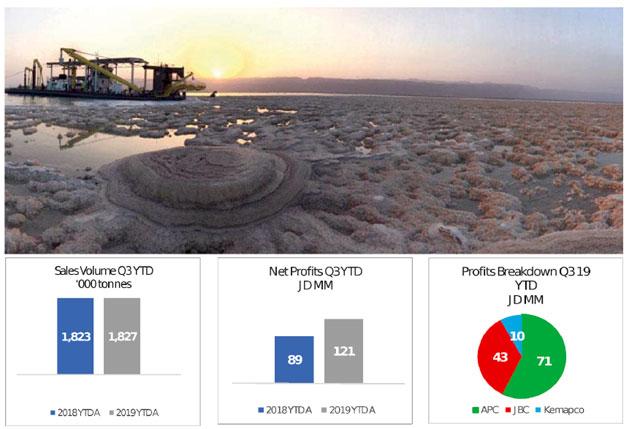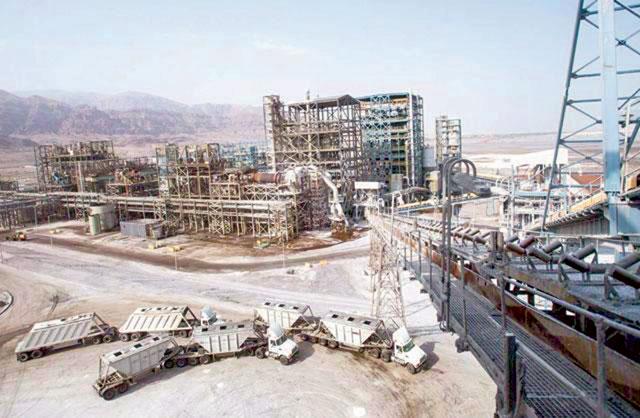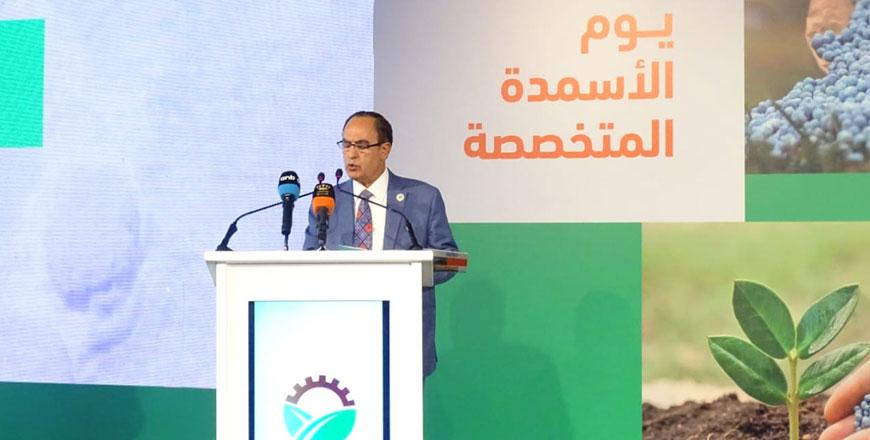You are here
APC net profits register 36% growth to JD121m in Q3
By JT - Nov 02,2019 - Last updated at Nov 02,2019

A potash production field in Ghor Safi area, where the Arab Potash Company operates, is seen in this undated photo (Photo courtesy of APC)
AMMAN — The Arab Potash Company (APC) announced on Saturday that its net profit after taxes, provisions and royalties amounted to JD121 million during the first nine months of 2019, recording an increase of 36 per cent from the JD89 million generated during the same period of last year.
Unveiling the company's third quarter financial results, APC’s Chairman of the Board of Directors Jamal Al Sarayrah said at a press conference on Saturday that potash production and sales operating profits grew by 103 per cent by the end of the third quarter to reach JD111 million.
"This came as a result of applying a sustainable, integrated plan to utilise all the company’s resources," Sarayrah said, adding that the APC also achieved record production and sales volumes of potash during the first nine months of 2019, reaching 1.88 million and 1.83 million tonnes respectively — "the highest recorded volumes ever in the company's history".
"Both records were all-time highs for the company and will translate positively to higher profits for the year," Al Sarayrah said.
In regards to the APC's direct contributions to the national economy, Sarayrah explained that Jordan's leading mining company paid the Treasury a total of JD71 million in 2018 in royalties, taxes, and dividends, expecting this year's contributions to grow by 58 per cent to reach JD112 million.
"The company is also a major contributor to the foreign exchange reserves of the country. Together with its subsidiaries and partners, the APC has brought $900 million worth of foreign reserves into the country during the first nine months of 2019," the chairman said.
"What the APC is going to pay to the Treasury by the end of this year constitutes around 73 per cent of the company's net profits. We hope we can transfer around $1.2 billion to the country's foreign exchange reserves by the end of 2019," Sarayrah noted.
Sarayrah also said the company has succeeded in reducing production costs by $15 per tonne, explaining that the APC's growth in production, sales and profits has been accompanied by the ability to enter new markets, including Brazil.
Expansion
The chairman also said that the company is working on expanding potash production and other fertiliser derivatives through several projects, adding that work is under way to expand production by 140,000 tonnes annually via a new dike project.
"There are also feasibility studies for utilising the Fifa region in the southern end of the Dead Sea, which will produce 500,000 tonnes of potash annually,” he said.
The company, in cooperation with the Ministry of Energy and Natural Resources, will begin evaluating the reserves of potash in the Lisan area by funding the technical studies which were recently awarded.
As for diversification of the derivatives, Sarayrah added that the company has launched a programme this year to study and evaluate all available options for utilising resources in the Dead Sea and Jordan, with the aim of taking advantage of them and manufacturing a mix of added value products and fertilisers, including phosphates, which are currently exported as raw materials.
CSR
In regards to the APC’s corporate social responsibility, Sarayrah pointed out that the APC has spent a total of JD11.4 million up until the end of the third quarter of this year on its various efforts and initiatives across the Kingdom, covering the education, health, social services and infrastructure sectors.
He added that the company's CSR programme also involves partnerships with local communities across the country, providing 60 scholarships for qualified applicants to study technical and engineering disciplines at Al Hussein Technical University.
"These programs are designed for potential future recruitment at the Arab Potash Company," said Sarayrah
The chairman also said that the company is in the process of "institutionalising" its CSR and is working on establishing its own charity corporation in cooperation with the government, all within His Majesty King Abdullah's vision to improve local communities.
"This reflects the company’s firm belief in preparing and qualifying the new generation of innovative and driven youth ready to contribute to the company’s future expansions as it embarks on executing its strategy involving construction, production and other activities which require trained and motivated manpower," Sarayrah said.
Strategic plan
APC President and CEO Maen Nsour explained that the company's “unprecedented achievements”, despite the challenges facing the international market, are "just a proof of Jordanians' ability to excel and exceed", vowing more successes in upcoming years.
Nsour said that the company has diversified its income through the sale of Dead Sea minerals, adding that the profits for the first three quarters of 2019 came from the sale of potash (57 per cent), its share of sales of bromine and derivatives by the Jordan Bromine Company (35per cent) and from the sale of the specialty fertiliser potassium nitrate by Arab Fertilisers and Chemicals Industries at 8 per cent.
He also said that production costs were reduced this year to a nine-year low through diversifying energy sources and capitalising on economies of scale.
"The production costs were reduced by 7.5 per cent, which made a major contribution to the bottom line,” Nsour said.
Nsour said that the APC’s board of directors approved last week a 10-year strategic plan prepared jointly by Deloitte and APC, which aims at "improving the company’s competitive position to ensure sustainable growth and integration for the Jordanian fertiliser manufacturing sector. The plan involves strengthening the infrastructure of the company through investing in its plants and dikes and assets".
Addressing an expected relative oversupply in the international market, Nsour explained that the APC has taken a set of "preemptive measures to mitigate some of the consequences by diversifying markets and products, as well as adding value to the commodity to meet inherent demand for different grades. This manifested in increased sales to new markets, of which Brazil is the most important, through a shipment of red granular potash which was made last September".
New markets
Hearing about the "high quality of the Jordanian red potash exported to Brazil", Nsour said that many countries are interested in buying the fertiliser, adding that the company is now in talks with 10 countries interested in importing red potash.
"The Brazilian market is considered the largest high return spot market. The production of red potash is a success story for the company, whereby its engineers were able to modify production lines to produce the required grade of red potash for the Brazilian market. This was not only done in a remarkably short period of time, but also achieved a quality of product better than traditional producers of this grade,” Nsour said.
The CEO said that workplace safety remains a top priority for the company, explaining that “record low” accident rates have also been registered, adding to the company's achievements.
APC is the eighth-largest potash producer worldwide by volume of production, and the sole producer of potash in the Arab world. Established in 1956 in the Kingdom as a pan-Arab venture, the APC operates under a concession from the government of Jordan that grants it exclusive rights to extract, manufacture and market minerals from the Dead Sea until 2058.
Related Articles
AMMAN — The Arab Potash Company (APC) has announced that its net profit after taxes, provisions and royalties amounted to JD78.2 million dur
AMMAN — Succeeding in putting Jordan on the world map through establishing a prime position in the global fertiliser market, the Arab Potash
AMMAN — The Arab Potash Company (APC) net profit for the first half of 2022 amounted to JD296 million compared to around JD80 million in the


















